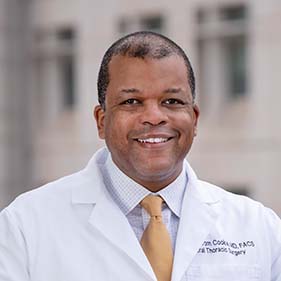Today is World Lung Cancer Day, a day when people around the world focus on the lives lost to lung cancer and raise awareness and support to prevent the devasting disease. More people die from lung cancer than from colon, breast and prostate cancers combined.
A new UC Davis Health Cultivating Health blog on lung cancer reports that it is the nation's leading cancer killer of both men and women. Smoking causes nearly 90% of lung cancer cases, and, unfortunately, over 70% of lung cancer cases are diagnosed at an advanced stage when survival rates are low.
UC Davis Comprehensive Cancer Center urges lung cancer screening on World Lung Cancer Day. According to the American Lung Association, only about 6% of eligible Americans undergo a lung cancer screening. That rate is even worse in our state, where only 1% of Californians who are eligible get a lung cancer screening.
Black Californians face major lung cancer burden
"Within these abysmal lung cancer screening rates exist distinct disparities that further concern us," said UC Davis lung cancer surgeon and chief of the Division of General Thoracic Surgery David Tom Cooke. "Specifically, communities of color are more likely to be diagnosed with advanced stages of lung cancer, which are more difficult to be cured—leaving the patient more likely to die from lung cancer."
UC Davis Comprehensive Cancer Center researchers published a report called The Burden of Cancer among Black and African Americans in California.
"What we found were concerning trends," said Cooke. "Black and African Americans are less likely to get screened for lung cancer than their white counterparts. However, when they are screened, their lung cancer survival, when detected early enough, is equal to their white counterparts. That's why we need research into how do to improve access for lung cancer screening for all populations."
New lung cancer screening guidelines recommended by the U.S. Preventive Services Task Force will help address health disparities and catch more cases of lung cancer, earlier. Under the new guidelines, anyone between the ages of 50 and 80 who has smoked at least 20 "pack-years" and either still smokes or quit within the last 15 years will be eligible.
A "pack-year" means smoking a pack of cigarettes a day for a year or an equivalent amount. Someone could qualify by smoking a pack a day for 20 years or two packs a day for 10 years. Previously, low-dose computed tomography (CT) scans were only recommended for heavier smokers (30 pack years), starting at age 55.
Specifically, communities of color are more likely to be diagnosed with advanced stages of lung cancer, which are more difficult to be cured-leaving the patient more likely to die from lung cancer."-David Tom Cooke, Chief, Division of General Thoracic Surgery
Symptoms of lung cancer
- new cough that won't go away
- new wheezing
- coughing up blood
- shortness of breath
- losing weight
- loss of appetite
- tired feeling
- hoarseness
Promising treatments
"Looking at the bright side, we have made incredible progress in clinical trials for lung cancer, and not just end-stage lung cancer but for early-stage lung cancer," said Cooke. "That includes precision medicine, targeted therapy, and includes immunotherapy, which is improving survival for patients who get lung cancer."
New robotic surgery techniques at UC Davis, including the first ever robotic-assisted bronchoscopy to remove lung cancer in a single surgery, are also helping save lives. Cooke shares the latest developments regarding lung cancer treatments on his YouTube channel Thoracic Talk.
UC Davis Health is committed to improving access to lung cancer screenings and started a multidisciplinary comprehensive Lung Cancer Screening Program







